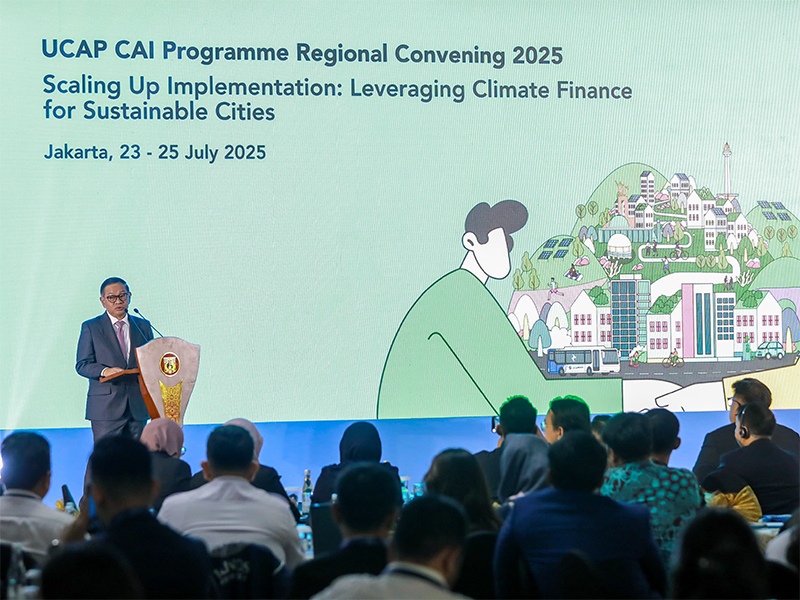

Wednesday, July 23rd 2025 Reporter: Dessy Suciati Translator: Maria Inggita 378

(Foto: Reza Pratama Putra)
Jakarta Governor Pramono Anung officially kicked off the Urban Climate Action Programme (UCAP) Climate Action Implementation (CAI) Regional Convening 2025 at Ayana Midplaza Hotel, Central Jakarta, on Wednesday (7/23).
"... the future energy use in Jakarta will include waste-to-energy solutions,"
In his remarks, Pramono highlighted Jakarta's achievements and commitments in addressing climate change. One of them is Jakarta's improved traffic congestion ranking, according to the TomTom survey. Once consistently among the world's 20 most congested cities, Jakarta now ranks 90th.
"When I became governor, I introduced a program called Transjabodetabek. Suddenly, Jakarta, which used to be in the top 20 most congested cities according to TomTom Survey, dropped into rank 90," he mentioned.
He also shared his experience from a visit to New York at the invitation of the United Nations (UN) to discuss similar issues. In a bilateral meeting with New York Mayor, they talk about traffic congestion, as both cities used to be in the global top 10 in the category.
However, congestion in Jakarta has since improved. In Indonesia, the most congested city is now Bandung, followed by Medan, Palembang, Surabaya, and then Jakarta.
Pramono linked this improvement to his policy requiring civil servants (ASN) to use public transporation every Wednesday.
He further noted that this meeting marks an important milestone for Jakarta. Since 2018, the C40 cities, supported by the UK government, have provided assistance to 35 cities worldwide, including Jakarta. He expressed gratitude and reaffirmed Jakarta’s full commitment to continued progress.
"We’d like to say thank you and express our full support for continued change," Pramono said.
Pramono also reaffirmed the city's commitment to ongoing improvements, including the development of Jakarta Green Building Regulation.
This regulation targets 100% energy and water efficiency for new buildings and 50% for existing buildings in 2030, which could reduce CO2 emissions by up to 10.6 million tons per year.
Moreover, Jakarta will utilize 55 million tons of waste reserves at Bantar Gebang, with a daily volume of 7,700 tons, as an energy source.
"I'm fortunate to have received direction and approval from the central government, from President Prabowo himself, that the future energy use in Jakarta will include waste-to-energy solutions," he explained.
He also stated that Jakarta will build four Waste-to-Energy Power Plants (PLTS) which are expected to support the city's efforts in becoming greener.
On this occasion, Pramono annoounced that the Jakarta Provincial Government has officially joined the Clean Investment Accelerator Initiative. Through this initiative, Jakarta is committed to shifting city financial away from fosil fuels toward climate solutions that foster a resilient and inclusive economy.
This initiative also promotes the development of green financial instruments, such as obligation, ESG (Environmental, Social, and Governance)-based portfolios, as well as sustainable policies adopted by C40 cities.
"These are the principles we aim to uphold," he asserted.